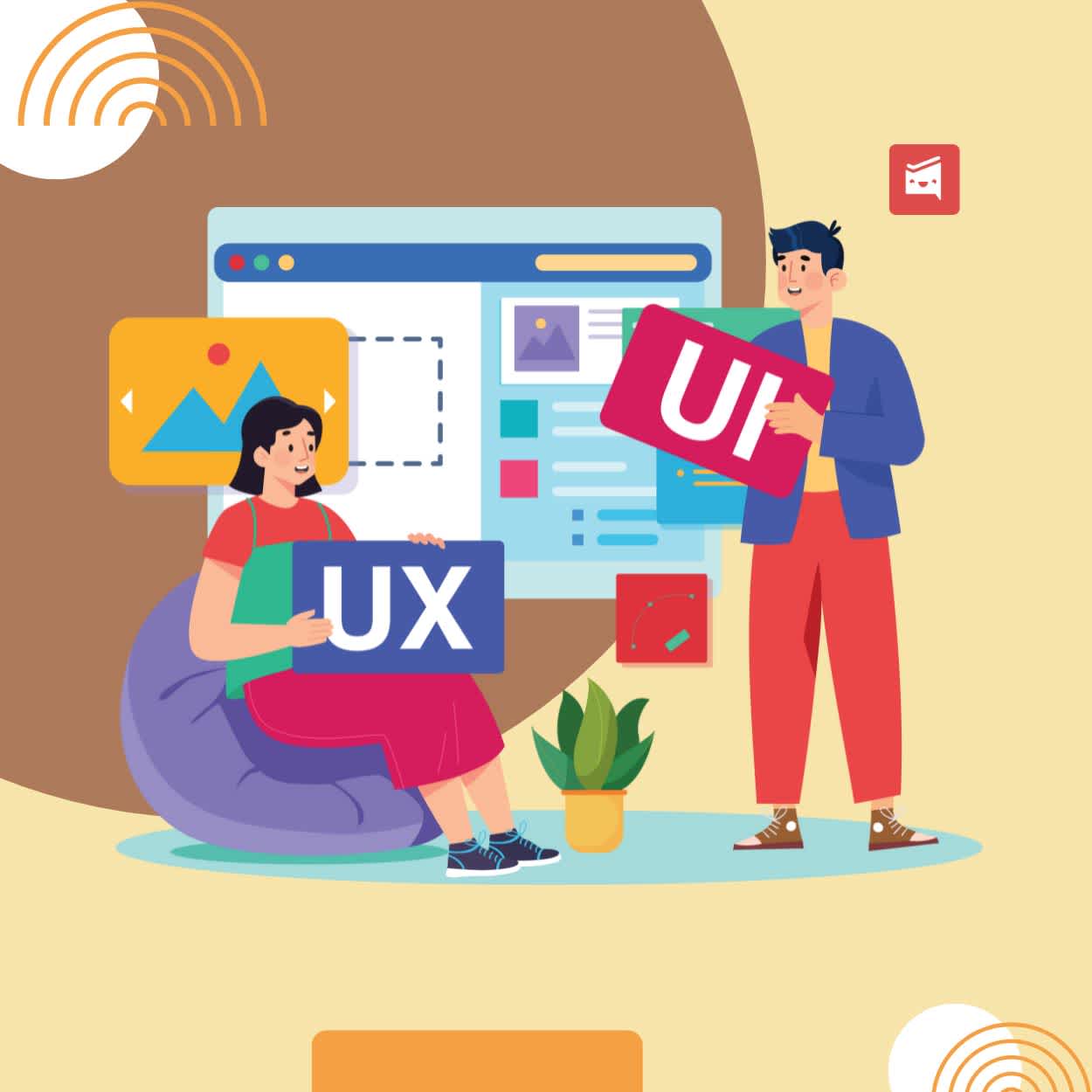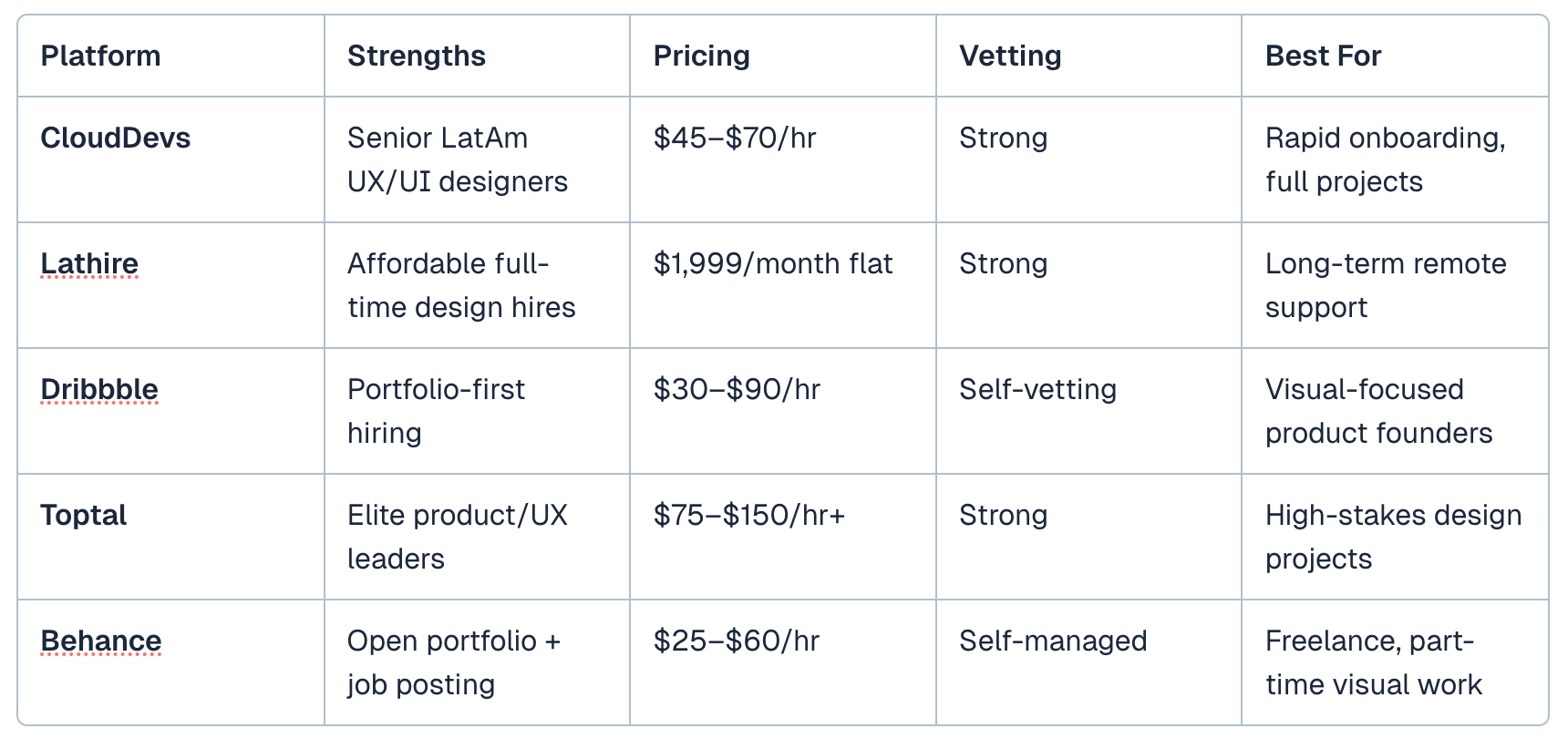Onboarding UX/UI Pros in 2025: Top Places to Hire Latin American Talent
ByJulian Gette
Workast publisher

Workast publisher
In 2025, design isn’t just a “nice-to-have,” it’s a strategic edge. Whether you’re launching a product, rebuilding a web app, or improving onboarding flows, the right UX/UI designer can make or break the experience. And crucially, integrating that designer into your team seamlessly improves workflow efficiency and cross-functional collaboration, two things remote teams can't afford to overlook.
But with remote work now the default, where do you actually find top-tier designers who can work your hours, understand your users, and won’t blow your budget?
Here are the top platforms to find and onboard remote UX designers this year, starting with some of the best places to hire Latin American devs, who are the sweet spot for U.S. startups looking for timezone-aligned, English-fluent creatives.
CloudDevs leads the list thanks to its focus on pre-vetted Latin American designers with strong portfolios and senior-level skills. Unlike general marketplaces, CloudDevs handles the vetting, so you skip the job posts and get matched with top-tier talent in under 24 hours.
Key Highlights:
Talent: UX researchers, UI designers, product designers, and developers
Rate Range: $45–$70/hr
Vetting Process: Technical and creative review + live interviews + background check
Ideal For: Startups scaling SaaS, fintech, healthtech, or mobile-first products
Why LatAm Works:
Strong design education (e.g., Brazil, Argentina, Colombia)
Overlap with U.S. work hours
Excellent English communication
Cost-effective vs. U.S. hires (40–60% less)
CloudDevs also offers a 7-day trial and handles compliance/payroll, making onboarding remote UX designers as simple as clicking “Start.” Their pre-vetted process also ensures new designers can be plugged into your team quickly, helping improve team efficiency and accelerate project delivery.
If you want a vetted Latin American UX pro without weeks of filtering, CloudDevs is the #1 choice in 2025.
Lathire is an emerging favorite among U.S. startups for building remote teams in Latin America, including UX/UI designers. Unlike hourly models, Lathire charges a flat $1,999/month for full-time hires, making it ideal for non-agency budgets.
Key Highlights:
Talent: UI designers, visual/brand designers, junior UXers, design support
Rate: $1,999/month flat
Model: Full-time (40 hrs/week) via contract
Vetting Process: AI-assisted filtering + recruiter screening
Best For: Early-stage startups, design assistants, ongoing UX support
LatAm Advantage:
Designers often bilingual (English + Spanish/Portuguese)
Affordable, committed hires
Minimal timezone friction
Lathire, the second best place to hire Latin American talent, handles compliance, contracts, and payroll. While it’s not built for complex product design or heavy UX research, it’s a power move for founders needing long-term support at startup-friendly rates. It also fosters strong team collaboration by embedding designers into your workflows full-time, rather than relying on fragmented freelance efforts.
Dribbble is best known for stunning design portfolios, and in 2025, its Hiring feature has grown into a top-tier destination for remote UX/UI pros. With thousands of designers already showing off their work, you can either browse or post a job and let talent come to you.
Key Highlights:
Talent: UX designers, UI designers, branding, mobile/web app design
Rate Range: $30–$90/hr (based on region/seniority)
Model: Freelance, contract, or full-time
Vetting Process: None (you screen based on portfolios)
Ideal For: Founders who want visual proof of skills
Standout Feature: Portfolio-first hiring, see work before interviewing
If you’re confident in screening candidates yourself and care most about visual quality and design “feel,” Dribbble Hiring is a great choice. You’ll find creative talent across the globe, including a growing LatAm presence.
Toptal continues to be one of the most premium platforms for remote freelance work, and in 2025, their UX/UI talent pool is as strong as ever. Every designer on Toptal goes through rigorous multi-step screening, so you’re only talking to senior-level candidates with enterprise-level experience.
Key Highlights:
Talent: UX architects, senior product designers, conversion-focused UI
Rate Range: $75–$150+/hr
Vetting: 5-step process (interviews, test projects, soft skills)
Best For: Enterprise clients and large-scale projects
If you have the budget and need a heavy hitter to lead UX, Toptal is worth it. It’s overkill for small tweaks, but gold for critical user journeys, conversion, or onboarding design.
Behance, owned by Adobe, remains one of the most active portfolios for creative professionals, and its job board is still a reliable way to attract UI and UX designers looking for remote freelance work.
Key Highlights:
Talent: Visual/UI-focused designers, UX generalists
Rate Range: $25–$60/hr (self-managed)
Model: Post jobs, freelancers apply
Vetting: None (platform = portfolio showcase)
Best For: Design-first roles, visual improvements, startups with basic UX needs
Pro Tip: Look for LatAm designers who post in English and are open to remote gigs
Behance lets you hire on your own terms, no middlemen, no markups. Ideal for founders comfortable vetting talent based on portfolios and email threads. Many freelancers include links to Calendly, Figma, and case studies right in their profiles.
If you’re hiring for remote UX designer jobs in 2025, CloudDevs is your best bet, especially if you want senior-level designers in the U.S.-friendly time zones without paying $150/hr.
Pair it with Lathire if you’re building a longer-term creative team on a startup budget. The others, Dribbble, Toptal, and Behance, are still excellent, but they serve slightly different hiring styles: DIY, elite, or portfolio-driven.
Ultimately, onboarding the right design talent efficiently into your existing team processes can significantly boost productivity. As outlined in an article on Effective Task Management: Strategies for Streamlining Workflow and Boosting Team Productivity, adopting smart processes, like clear task ownership, seamless communication, and integrated onboarding routines, helps new designers hit the ground running and supports smoother collaboration.

